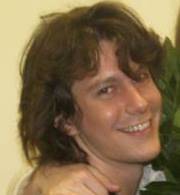Attention & Cognitive Control
Nilli LavieGroup Leader
+44 20 7679 5404 |  |
Attention & Cognitive Control Research
Psychological and neural mechanisms of: attention, distraction, visual awareness, executive control, interaction of emotion attention and awareness. Special focus on information processing capacity and the effects of different types of information load on brain activity, cognitive function and task performance, neural correlates of awareness, executive frontal control of attention and behaviour, individual differences in attention abilities. Methods used: behavioural experiments, neuroimaging, machine learning.
Group Members
Post-Doctoral Research Fellows
- Alina Bialkowski

My work is at the intersection of computer vision, machine learning and cognitive neuroscience, and involves the modelling of attention for real world applications. I develop computational models to represent visual information (i.e. images and video) to better understand distraction, load and attention mechanisms in the brain. I also develop visualisations of machine learning and computer vision models to bring human understanding to data.
- Joshua Eayrs

My research is focused on establishing methods to measure the perceptual processing capacity on an individual level and potentially develop training methods to enhance this capacity. Over the past four years I studied for a BSc in Psychology at Bangor University followed by an MSc in Neuroimaging also at Bangor. Prof. Nilli Lavie is my PhD supervisor, my secondary supervisor is Prof. Chris McManus.
- Anthony Harris

anthony.m.harris@ucl.ac.uk Broadly, my research examines the properties that influence whether we attend to the objects in our surroundings, and how such attentional allocation is produced by the brain. In particular, I investigate the role of rhythmic fluctuations in brain activity – so called ‘neural oscillations’ – in human attention and perception. I employ a range of techniques including behavioural measurements, eye-tracking, electroencephalography (EEG) and magnetoencephalography (MEG), and non-invasive brain stimulation, to examine these processes both in the lab and in the applied contexts of every-day life.
- Fintan Nagle

Fintan is a vision scientist with a computational background. After BSc and MRes training in computer science and bioinformatics, he competed PhD research in experimental psychology, conducting the first analysis of temporal visual search on dynamic natural scenes. His current research interests are modelling and prediction of the attentional state during task-switching behaviour, temporal visual search, and knowledge representation for data and model sharing.
- Daniel Pearson

daniel.pearson@ucl.ac.uk My research focuses on the cognitive mechanisms underlying how and why we pay attention to objects in the world. In particular, I am interested in understanding the ways in which our learned experience with a stimulus (i.e., “selection history”) affects attentional selection, and how this interacts with an individual’s cognitive and perceptual capacity. I am also interested in the relationship between attentional biases and psychopathology, which aligns with my training as a clinician. I use a range of techniques to examine these processes, including behavioural measurements, eye-tracking, and electroencephalography (EEG).
PhD Students
- Vivien Albrecht

vivien.albrecht.18@ucl.ac.uk My research focuses on the neurophysiological changes accompanying age effects on attention and cognitive control. I plan to use a range of measures, including broadband near infrared spectroscopy (BNIRS) and functional magnetic resonance imaging (fMRI). Previously, I completed a BSc in Psychology at Maastricht University, followed by an MRes in Brain Sciences at UCL.
- Luca Chech

luca.chech.16@ucl.ac.uk Over the last two decades we have witnessed an ever increasing amount of automation components (adaptive cruise control, lane keeping, etc.) being incorporated into our automobiles, and it has now become clear that all of these automations and more will converge in the near future to enable the next big revolution in the transportation domain: self-driving cars. It is also clear that such a profound change will not happen overnight and we will most likely go through a transition period, during which the automation will not be able to handle every situation. In these cases, the car will issue a take-over request and the driver will be required to take back control as swiftly as possible. The aim of my PhD is to understand the demands posed by these take-over request on the drivers' attentional system. Furthermore, I intend to evaluate how a range of secondary, non-driving tasks (mailing, browsing, watching videos) that drivers will likely engage in while onboard a self-driving car are going to affect the take-over time and other parameters of interest. I have previously completed a BSc in Psychology and Neurobiology and a MSc in Experimental Psychology at the University of Padua, followed by a one-year research assistantship at the Human Technology Lab in Padua. I am also broadly interested in HCI, games research, group dynamics and group-decision support systems.
- Michael Hobbiss

michael.hobbiss.15@ucl.ac.uk I am interested in the types of cognitive control required for educational success, especially during the period of adolescence. How well do young people, whose ability to control their thoughts and attention is still developing, cope with the sometimes overwhelming number of concurrent information sources in the modern world? What differences are there between adolescents and adults, and what do these differences tell us about brain and cognitive development in this period? I run laboratory experiments and also work with schools to try to answer these sorts of questions, measuring things distraction, emotion and multi-tasking ability.
- Katharine Molloy

k.molloy.11@ucl.ac.uk My research focuses on how well we perceive perceptual stimuli when our attention is engaged elsewhere. Much of the recent research in this field has focused on visual tasks. But the world is a multisensory place! Coming from a background of hearing research, I plan to look at whether the effects seen in the visual domain also apply for auditory tasks, and how focusing our attention in one modality affects our perception of the other.
- Merit Bruckmaier

merit.bruckmaier.16@ucl.ac.uk My research focusses on the neurophysiological mechanisms underlying attention and perception, as well as exploring how they are limited. I use a range of measures, including broadband near-infrared spectroscopy (BNIRS), electroencephalography (EGG), and pupillometry as markers of neural processes associated with (in)attention and perception. My PhD is co-funded by the ERSC and Toyota Motor Europe, meaning that I have a particular interest in translational research which links neuroscience and technology. Previously, I have completed a BA in Experimental Psychology, followed by an MSc in Neuroscience, both at the University of Oxford.
 Close
Close



